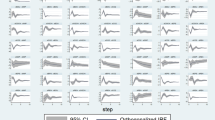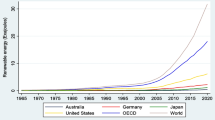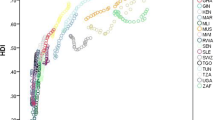Abstract
This paper analyses the impact of several factors on the use of renewable energy sources in a set of European Union countries, by applying a quantile regression approach. We find that different factors are effective for different levels of renewable energy commitment and the magnitudes of some effects evolve in accordance with the level of renewable energy sources used. Consequently, some policies that do not take into account the different stages could carry different effects. The results suggest that the lobbying effect of the established industries hampers the development of renewable sources, and that this effect is greater for lower initial level of renewable energy use. The results reveal that environmental concerns have not yet achieved enough pressure to stimulate major developments on renewables. We include two new drivers, geographic area and European Union Directive 2001/77/EC. That Directive was effective in signaling the commitment to renewables, namely for countries with lower renewables use.
Similar content being viewed by others
References
Bird L, Bolinger M, Gagliano T, Wiser R, Brown M, Parsons B (2005) Policies and market factors driving wind power development in the United States. Energy Policy 33: 1397–1407
Carley S (2009) State renewable energy electricity policies: an empirical evaluation of effectiveness. Energy Policy 37: 3071–3081
Chang T, Huang C, Lee M (2009) Threshold effect of the economic growth rate on the renewable energy development from a change in energy price: evidence from OECD countries. Energy Policy 37: 5796–5802
EU (2001) Directive 2001/77/EC on the promotion of electricity produced from renewable energy sources in the internal electricity market
EU (2009) Directive 2009/28/EC on the promotion of the use of energy from renewable sources and amending and subsequently repealing Directives 2001/77/EC and 2003/30/EC
Gan L, Eskeland G, Kolshus H (2007) Green electricity market development: lessons from Europe and the US. Energy Policy 35: 144–155
Harmelink M, Voogt M, Cremer C (2006) Analyzing the effectiveness of renewable energy supporting policies in the European Union. Energy policy 34: 343–351
Heal G (2010) Reflections—the economics of renewable energy in the United States. Rev Environ Econ Policy 4(1): 39–154
Huang M-Y, Alavalapati J, Carter D, Langholtz M (2007) Is the choice of renewable portfolio standards random. Energy Policy 35: 5571–5575
Johnstone N, Haščič I, Popp D (2010) Renewable energy policies and technological innovation: evidence based on patent counts. Environ Resour Econ 45: 133–155
Koenker R, Bassett G (1978) Regression quantiles. Econometrica 46(1): 33–50
Koenker R, Hallock K (2001) Quantile regression. J Econ Perspectives 15(4): 143–156
Menyah K, Wolde-Rufael Y (2010) CO2 emissions, nuclear energy, renewable energy and economic growth in the US. Energy Policy 38: 2911–2915
Menz F, Vachon S (2006) The effectiveness of different policy regimes for promoting wind power: experiences from the States. Energy Policy 34: 1786–1796
O’Garra T, Mourato S (2007) Public preferences for hydrogen buses: comparing interval data, OLS and quantile regression approaches. Environ Resour Econ 36: 389–411
Sadorsky P (2009) Renewable energy consumption, CO2 emissions and oil prices in the G7 countries. Energy Economics 31: 456–462
Sadorsky P (2009) Renewable energy consumption and income in emerging economies. Energy Policy 37: 4021–4028
Sovacool B (2009) Rejecting renewables: the socio-technical impediments to renewable electricity in the United States. Energy Policy 37: 4500–4513
Vachon S, Menz F (2006) The role of social, political, and economic interests in promoting state green electricity policies. Environ Sci Policy 9: 652–662
Van Ruijven B, Van Vuuren D (2009) Oil and natural gas prices and greenhouse gas emission mitigation. Energy Policy 37: 4797–4808
Van Rooijen S, Van Wees M (2006) Green electricity policies in the Netherlands: an analysis of policy decisions. Energy Policy 34: 60–71
Wang Y (2006) Renewable electricity in Sweden: an analysis of policy and regulations. Energy Policy 34: 1209–1220
Wüstenhagen R, Bilharz M (2006) Green energy market development in Germany: effective public policy and emerging customer demand. Energy Policy 34: 1681–1696
Author information
Authors and Affiliations
Corresponding author
Additional information
Research supported by: NECE, I&D unity funded by the FCT - Portuguese Foundation for the Development of Science and Technology, Ministry of Science, Technology and Higher Education.
Rights and permissions
About this article
Cite this article
Marques, A.C., Fuinhas, J.A. & Manso, J.P. A Quantile Approach to Identify Factors Promoting Renewable Energy in European Countries. Environ Resource Econ 49, 351–366 (2011). https://doi.org/10.1007/s10640-010-9436-8
Accepted:
Published:
Issue Date:
DOI: https://doi.org/10.1007/s10640-010-9436-8




